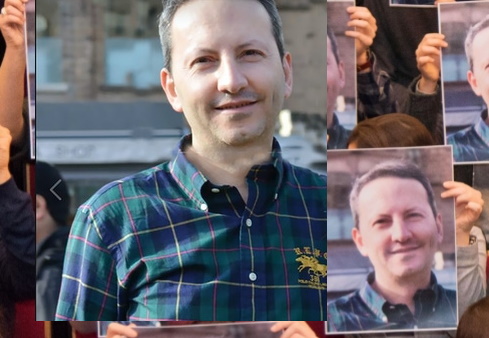
EU must stand up for jailed Iranian scholar Ahmadreza Djalali

In
A Swedish citizen faces capital punishment without a fair trial. The EU cannot afford to stay silent.
In a faraway prison, an Iranian-Swedish scientist awaits execution.
Ahmadreza Djalali, a specialist in disaster medicine sentenced to death for allegedly collaborating with Israeli intelligence, was told last week that his execution is imminent.
Faced with this grim development, Sweden and Belgium, as well as the NGO Amnesty International, have deployed all possible means to halt his execution.
If the European Union is serious about defending the rule of law and the rights of its citizens, it needs to come out strongly in defense of Djalali too. It cannot allow Djalali, like other dual citizens before him, to be reduced to mere pawns in a game of geopolitical chess.
Read the full text below.
This article was first published in POLITICO.
(Photo credit: Amnesty International Vlaanderen)
*****
EU must stand up for jailed Iranian scholar Ahmadreza Djalali
In a faraway prison, an Iranian-Swedish scientist awaits execution.
Ahmadreza Djalali, a specialist in disaster medicine sentenced to death for allegedly collaborating with Israeli intelligence, was told last week that his execution is imminent.
Faced with this grim development, Sweden and Belgium, as well as the NGO Amnesty International, have deployed all possible means to halt his execution.
If the European Union is serious about defending the rule of law and the rights of its citizens, it needs to come out strongly in defense of Djalali too. It cannot allow Djalali, like other dual citizens before him, to be reduced to mere pawns in a game of geopolitical chess.
While Djalali may be of Iranian descent, he is also a Swedish and EU citizen, since 2018. Most importantly, he is a human being who has been denied a fair trial. The U.N.’s Working Group on Arbitrary Detention has labeled his incarceration as arbitrary and in contravention of the Universal Declaration of Human Rights and the International Covenant on Civil and Political Rights. His confession was obtained under duress.
The news of Djalali’s imminent execution happened, perhaps not coincidentally, just as a Belgian court opened a trial against four Iranian nationals suspected of plotting a terrorist attack on an Iranian opposition rally in Paris.
As such, Iran is not only failing to guarantee the rights of Djalali but also appears to be seeking to instrumentalize the fate of an EU citizen in an effort to put pressure on judicial proceedings in Europe.
The Belgian court is now in the position of having to pass an independent verdict on a failed terrorist plot in the knowledge that its ruling may mean the difference between life and death for a scholar incarcerated in Iran.
Against this backdrop, the EU cannot afford to stay silent. A Swedish citizen faces capital punishment for crimes that remain unproven.
In the past, the EU — and its foreign policy arm, the European External Action Service (EEAS), in particular — has prided itself on the critical role it played in finding a diplomatic agreement on the Iranian nuclear program.
It cannot now allow Iran to use Djalali as part of a cynical quid pro quo maneuver in its diplomatic games. It is unreasonable for Tehran to expect the EU not to interfere in its internal affairs while it is disregarding the rights of an EU citizen and putting pressure on the rule of law in EU member countries.
Scholars such as Djalali — who is affiliated with Belgium’s Vrije Universiteit Brussel (VUB) — are servants of the public interest. They devote themselves to expanding the body of knowledge and passing it on to the next generation. Djalali did so in the field of disaster medicine. As the world battles to contain the raging COVID-19 pandemic, the efforts scientists and medical staff like him are more important than ever.
In Iran, which was one of the early countries to be fiercely hit by the virus, even convicts were called upon to assist in the emergency effort. Djalali himself acted as liaison relaying emergency protocols developed by our university hospital in Brussels to Iranian authorities. Yet in a grim display of cynicism, the Iranian regime has chosen to treat Djalali like a cat playing with its prey. Not only does this hamper the ongoing struggle against the ongoing pandemic, it is an affront to human dignity.
As scholars, citizens and colleagues of Djalali, we expect the EU to take urgent action.
Firstly, we call upon the European Commission and the EEAS to join the European Parliament in condemning the imprisonment of EU-Iranian dual nationals by the Iranian authorities following unfair trials.
Secondly, we expect the European institutions to mobilize the EU’s collective clout behind the ongoing efforts of the Swedish and Belgian governments to ensure that the death penalty is not enforced and to insist on Djalali’s right to a fair trial.
Thirdly, the European Council must recognize that it has a unique opportunity to re-energize European diplomacy vis-à-vis Iran. If the Iranian nuclear agreement is to be resurrected, the situation demands the multilateral engagement of the EU as well as respect for core EU values by Iran.
In the fate of a single human being, several important issues have coincided: the need to protect the rights of EU citizens and the rule of law, and the urgency for Europe to speak with a strong voice on the international stage.
The EU must use this opportunity to prove its mettle as a diplomatic actor that can engage with Iran constructively — without jeopardizing what it stands for.
Caroline Pauwels is the rector of the Vrije Universiteit Brussel (VUB), where Ahmadreza Djalali is affiliated as guest professor. Alexander Mattelaer is the vice dean for research of the VUB’s Institute for European Studies and a senior research fellow at Egmont — the Royal Institute for International Relations.